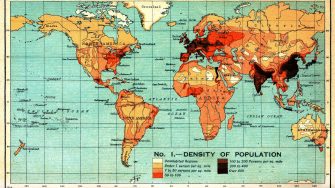
About us
The Laureate Centre for History & Population researches how population policies emerged over the nineteenth and twentieth centuries, and what their present legacies are, especially in a climate-changed world. We consider the significance of population for modern world history, economic history, environmental history, and the history of ideas, each of which were and are gendered and raced. Our focus is on the Asia Pacific region: the great environmental, demographic, political and economic differences between East Asia, South Asian and Australasian politics. We explore other national, regional and international histories comparatively.As the planet approaches 8 billion, international debate on population will be ignited again. Population is an urgent and sensitive global concern in a climate-crisis era, from net growth, to ageing, to low fertility. The Laureate Centre for History & Population approaches the multi-dimensional challenge of population from all angles. It invites expertise on soil fertility and human fertility; economy and ecology; space, growth and limits; food security, energy and waste. Reproductive politics, health politics, and geopolitics all bear on population policy making. State, familial, and individual governance have affected consumption, production, and reproduction in the past and into the climate-changed present.
For more information and updates on the Laureate Centre for History & Population, visit our website.
Our people
The Laureate Centre for History & Population is directed by Professor Alison Bashford, whose research connects the history of science, global history, and environmental history into new assessments of the modern world. Her recent books The New Worlds of Thomas Robert Malthus (with Prof Joyce Chaplin, Princeton University Press, 2016) and Global Population (Columbia University Press, 2014), offer large-scale and integrated analyses of the how the twenty-first century world came to be.
Professor Bashford is joined by three Laureate Postdoctoral Fellows and a Centre Manager.
-
Laureate Centre Manager, is a scholar of imperial and colonial history. Most recently a Postdoctoral Fellow on the ‘Inquiring into Empire’ project at UNSW, she holds a Ph.D. from the University of Cambridge.
-
Laureate Postdoctoral Fellow, is a historian of cities, infrastructure, and imperialism who works primarily on the modern Middle East and the Global French Empire. Dr. Pascoe joins UNSW from the University of California, Irvine, where he was recently a Mellon Humanities Faculty Fellow in the School of Humanities. Dr. Pascoe also holds a Ph.D. from the University of California, Irvine.
-
Laureate Postdoctoral Fellow, is a historian of gender, labour, and colonialism who focuses on transnational histories of Oceania and Europe. Dr. Thomas joins UNSW from the University of Michigan, where she held Fellowships at the Eisenberg Institute for Historical Studies and the Institute of Humanities. Dr. Thomas’ Ph.D. is also from the University of Michigan.
